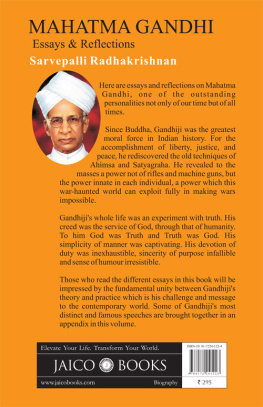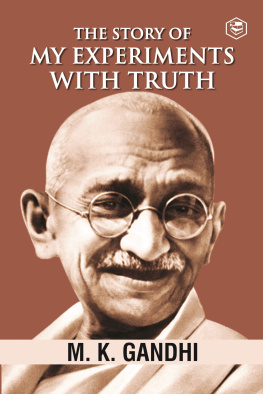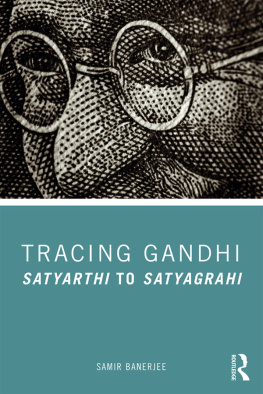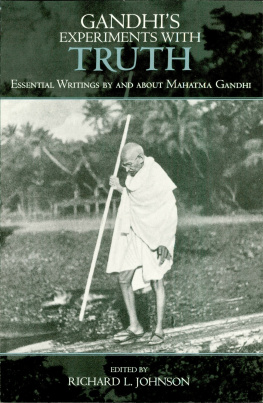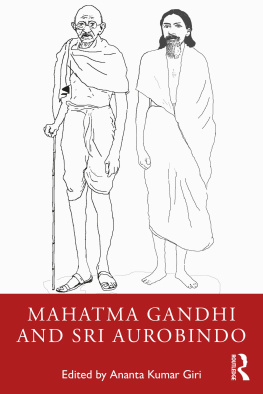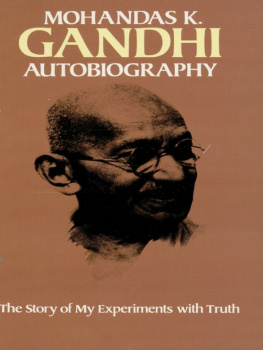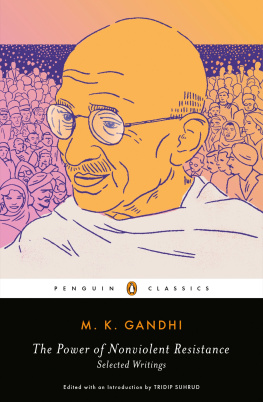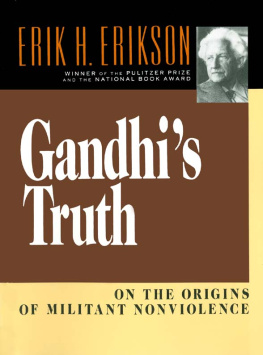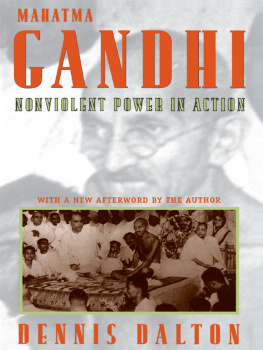
Published by Jaico Publishing House
A-2 Jash Chambers, 7-A Sir Phirozshah Mehta Road
Fort, Mumbai - 400 001
www.jaicobooks.com
Jaico Publishing House
Complete & Unabridged
MAHATMA GANDHI
ISBN 81-7224-122-4
First Jaico Impression: 1957
Twenty-third Jaico Impression (Reformatted): 2010
No part of this book may be reproduced or utilized in
any form or by any means, electronic or
mechanical including photocopying, recording or by any
information storage and retrieval system,
without permission in writing from the publishers.
PREFACE TO THIS EDITION
It was my desire to re-edit this volume and present it toGandhi on his eightieth birthday, October 2, 1949. Fatesdecreed otherwise, and it has now become a memorial volume.
No country but India and no religion but Hinduism couldhave given birth to a Gandhi, said the editorial in the LondonTimes on the day after his death. It is true that we see inGandhi the qualities we regard as characteristic of India, i.e.characteristic of India at its inspired best. Yet he belongedby right to humanitys greatest of all time. Asia has awakenedunder the touch of Europe, and Europe, in its presentdisordered and puzzled condition, is looking towards theEast. To a world which is being shattered by mans selfi sherror and intolerance, which is questioning the divine natureof the human spirit, Gandhis message of the life ofGod is the soul of man and of the way of non-violence inhuman conduct is of supreme value. In this hour of crisisIndia is proud to have made such an imperishable contribution.
A few extracts from the many and varied tributes to Gandhiafter his death are reprinted in Appendix II.
S.R.
PREFACE TO THE FIRST EDITION
Owing to the distracted condition of the world-a war in theEast and a near-war in Europe-and my absence from Indiasince the end of last year, it has not been possible to gettogether all the persons who would have been glad to join inthis world tribute to Mahatma Gandhi on his seventieth birthday.
The different essays and refl ections, each with its individualcharacter, might be expected to make the book uneven anddisconnected, but I hope that it has not done so. Almost everypage is knit together by a central and never-forgotten theme,the challenge and message of Gandhi to the contemporary world.By general admission something is wrong with it. We are livingin a singular moment of history, a moment of crisis, in the literalsense of the word. In every branch of our activity, material andspiritual, we seem to have arrived at a critical turning-point.Those who have surveyed the scene have given us differentanswers about the cause and cure of our ailing civilization.Gandhi tells us that we, who constitute the social order, are thedisease and we must change, if civilization is to improve.
Those who read these pages will be impressed by thefundamental unity between Gandhis theory and practice, theexquisite harmony of his life and work, which is the very essenceof sincerity. It marks him out as one of the outstandingpersonalities, not only of our time but of all time.
The contributions are arranged in alphabetical order. A few ofGandhis most distinctive utterances which are of more thanlocal and temporary importance are brought together in anAppendix.
The Editor thanks Mr. Stephen Hobhouse for his kindness inreading the proofs.
S.R.
INTRODUCTION
GANDHIS RELIGION AND POLITICS
BY SIR S. R ADHAKRISHNAN
(University of Oxford)
The greatest fact in the story of man on earth is not his material achievement, the empires he has built and broken, but the growth of his soul from age to age in its search for truth and goodness. Those who take part in this adventure of the soul, secure an enduring place in the history of human culture. Time has discredited heroes as easily as it has forgotten everyone else; but the saints remain. The greatness of Gandhi is more in his holy living than in his heroic struggles, in his insistence on the creative power of the soul and its life-giving quality at a time when the destructive forces seem to be in the ascendant.
I. Religious Basis of Politics
Gandhi is known to the world as the one man more than any other who is mainly responsible for the mighty upheaval of the Indian nation which has shaken and loosened its chains. Politicians are not generally reputed to take religion seriously, for the values to which they are committed, such as the political control of one people by another, the economic exploitation of the poorer and weaker human beings, are so clearly inconsistent with the values of religion that the latter could not be taken too seriously or interpreted too accurately. But for Gandhi, all life is of one piece. To see the universal and all pervading Spirit of Truth face to face one must be able to love the meanest of creation as oneself. And a man who aspires after that cannot afford to keep out of any field of life. That is why my devotion to Truth has drawn me into the field of politics; and I can say without the slightest hesitation and yet in all humility, that those who say that religion has nothing to do with politics do not know what religion means! Again, I have no desire for the perishable kingdom of earth, I am striving for the kingdom of heaven, which is spiritual deliverance. For me the road to salvation lies through incessant toil in the service of my country and of humanity. I want to identify myself with everything that lives. In the language of the Gita, I want to live at peace with both friend and foe. So my patriotism is for me a stage on my journey to the land of eternal freedom and peace. Thus it will be seen that for me there are no politics devoid of religion. They subserve religion. Politics bereft of religion are a death-trap because they kill the soul. If man as a political being has not been much of a success, it is because he has kept religion and politics apart, thus misunderstanding both. For Gandhi, there is no religion apart from human activity. Though in the present circumstances of India, Gandhi happens to be a political revolutionary who refuses to accept tyranny or acquiesce in slavery, he is far from the uncompromising type of revolutionary whose abstraction forces men into unnatural and inhuman shapes. In the acid test of experience he remains, not a politician or a reformer, not a philosopher or a moralist, but someone composed of them all, an essentially religious person endowed with the highest and most human qualities and made more lovable by the conscic asness of his own limitations and by an unfailing sense of humour.
II. Religion as Life in God
Whatever opinion we may hold of God, it is impossible to deny that He means something of supreme importance and absolute reality to Gandhi. It is his faith in God that has created in him a new man whose power and passion and love we feel. He has the feeling of something close to him, a spiritual presence which disturbs, embarrasses and overwhelms, an assurance of reality. Times without number, when doubts disturb his mind, he leaves it to God. Was there a response from God? No and Yes. No, for Gandhi does not hear anything said even by the most secret or the most distant of voices; yes, because he has a sense of reply, the appeased, satisfied feeling of one who has received an answer. It is indeed from the nature of the reply which is so eminently rational that he recognizes that he is not the victim of his own dreams or hallucinations. There is an indefinable, mysterious power that pervades everything. I feel it though I do not see it. It is this unseen power which makes itself felt and yet defies all proof because it is so unlike all that I perceive through my senses. It is proved not by extraneous evidence but in the transformed conduct and character of those who have felt the real presence of God within. Such testimony is to be found in the experiences of an unbroken line of prophets and sages in all countries and climes. To reject this evidence is to deny oneself.
Next page
